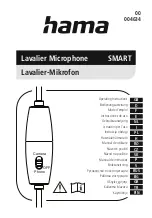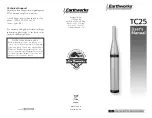
5-228
L60 Line Phase Comparison System
GE Multilin
5.5 GROUPED ELEMENTS
5 SETTINGS
5
•
BF1 BKR POS1
A
/3P:
This setting selects the FlexLogic operand that represents the protected breaker early-type
auxiliary switch contact (52/a). When using the single-pole breaker failure scheme, this operand represents the pro-
tected breaker early-type auxiliary switch contact on pole A. This is normally a non-multiplied form-A contact. The con-
tact may even be adjusted to have the shortest possible operating time.
•
BF1 BKR POS2
A
/3P:
This setting selects the FlexLogic operand that represents the breaker normal-type auxiliary
switch contact (52/a). When using the single-pole breaker failure scheme, this operand represents the protected
breaker auxiliary switch contact on pole A. This may be a multiplied contact.
•
BF1 BREAKER TEST ON:
This setting is used to select the FlexLogic operand that represents the breaker in-service/
out-of-service switch set to the out-of-service position.
•
BF1 PH AMP HISET PICKUP:
This setting sets the phase current output supervision level. Generally this setting
should detect the lowest expected fault current on the protected breaker, before a breaker opening resistor is inserted.
•
BF1 N AMP HISET PICKUP:
This setting sets the neutral current output supervision level. Generally this setting
should detect the lowest expected fault current on the protected breaker, before a breaker opening resistor is inserted.
Neutral current supervision is used only in the three pole scheme to provide increased sensitivity.
This setting is valid
only for three-pole breaker failure schemes
.
•
BF1 PH AMP LOSET PICKUP:
This setting sets the phase current output supervision level. Generally this setting
should detect the lowest expected fault current on the protected breaker, after a breaker opening resistor is inserted
(approximately 90% of the resistor current).
•
BF1 N AMP LOSET PICKUP:
This setting sets the neutral current output supervision level. Generally this setting
should detect the lowest expected fault current on the protected breaker, after a breaker opening resistor is inserted
(approximately 90% of the resistor current).
This setting is valid only for three-pole breaker failure schemes
.
•
BF1 LOSET TIME DELAY:
Sets the pickup delay for current detection after opening resistor insertion.
•
BF1 TRIP DROPOUT DELAY:
This setting is used to set the period of time for which the trip output is sealed-in. This
timer must be coordinated with the automatic reclosing scheme of the failed breaker, to which the breaker failure ele-
ment sends a cancel reclosure signal. Reclosure of a remote breaker can also be prevented by holding a transfer trip
signal on longer than the reclaim time.
•
BF1 PH A INITIATE / BF1 PH B INITIATE / BF 1 PH C INITIATE:
These settings select the FlexLogic operand to initi-
ate phase A, B, or C single-pole tripping of the breaker and the phase A, B, or C portion of the scheme, accordingly.
This setting is only valid for single-pole breaker failure schemes
.
•
BF1 BKR POS1
B / BF1 BKR POS 1
C:
These settings select the FlexLogic operand to represents the protected
breaker early-type auxiliary switch contact on poles B or C, accordingly. This contact is normally a non-multiplied Form-
A contact. The contact may even be adjusted to have the shortest possible operating time.
This setting is valid only for
single-pole breaker failure schemes
.
•
BF1 BKR POS2
B:
Selects the FlexLogic operand that represents the protected breaker normal-type auxiliary switch
contact on pole B (52/a). This may be a multiplied contact.
This setting is valid only for single-pole breaker failure
schemes
.
•
BF1 BKR POS2
C:
This setting selects the FlexLogic operand that represents the protected breaker normal-type
auxiliary switch contact on pole C (52/a). This may be a multiplied contact. For single-pole operation, the scheme has
the same overall general concept except that it provides re-tripping of each single pole of the protected breaker. The
approach shown in the following single pole tripping diagram uses the initiating information to determine which pole is
supposed to trip. The logic is segregated on a per-pole basis. The overcurrent detectors have ganged settings.
This
setting is valid only for single-pole breaker failure schemes
.
Upon operation of the breaker failure element for a single pole trip command, a three-pole trip command should be
given via output operand
BKR FAIL 1 TRIP OP
.
Summary of Contents for L60
Page 10: ...x L60 Line Phase Comparison System GE Multilin TABLE OF CONTENTS ...
Page 57: ...GE Multilin L60 Line Phase Comparison System 2 27 2 PRODUCT DESCRIPTION 2 3 SPECIFICATIONS 2 ...
Page 58: ...2 28 L60 Line Phase Comparison System GE Multilin 2 3 SPECIFICATIONS 2 PRODUCT DESCRIPTION 2 ...
Page 482: ...6 26 L60 Line Phase Comparison System GE Multilin 6 5 PRODUCT INFORMATION 6 ACTUAL VALUES 6 ...
Page 554: ...10 8 L60 Line Phase Comparison System GE Multilin 10 2 BATTERIES 10 MAINTENANCE 10 ...
Page 674: ...B 110 L60 Line Phase Comparison System GE Multilin B 4 MEMORY MAPPING APPENDIX B B ...
Page 704: ...C 30 L60 Line Phase Comparison System GE Multilin C 7 LOGICAL NODES APPENDIX C C ...
Page 720: ...E 10 L60 Line Phase Comparison System GE Multilin E 1 PROTOCOL APPENDIX E E ...
Page 732: ...F 12 L60 Line Phase Comparison System GE Multilin F 2 DNP POINT LISTS APPENDIX F F ...
Page 742: ...H 8 L60 Line Phase Comparison System GE Multilin H 3 WARRANTY APPENDIX H H ...
















































